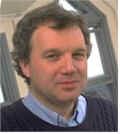 Late Sunday afternoon (28 May 2006), William Morrow gave his address as outgoing President of the Canadian Society of Biblical Studies. Morrow is Associate Professor of Hebrew Scriptures at Queen’s University in Kindston, Ontario. He is author of Scribing the Center: Organization and Redaction in Deuteronomy 14:1 17:13 (Atlanta: Society of Biblical Literature, 1995; Buy from Amazon.ca | Buy from Amazon.com).
Late Sunday afternoon (28 May 2006), William Morrow gave his address as outgoing President of the Canadian Society of Biblical Studies. Morrow is Associate Professor of Hebrew Scriptures at Queen’s University in Kindston, Ontario. He is author of Scribing the Center: Organization and Redaction in Deuteronomy 14:1 17:13 (Atlanta: Society of Biblical Literature, 1995; Buy from Amazon.ca | Buy from Amazon.com).
 Morrow’s address was entitled, “Violence and Transcendence in the Development of Biblical Religion.” He began by noting the disappearance of individual lament/complaint prayer in the Second Temple period. The laments you do find in the Second Temple period differ from the earlier individual complaint psalms in that they tend to be in a narrative context, they neglect individual suffering, combine individual and communal elements, and have a unique status. According to Morrow, instead of individual lament psalms where the psalmist complains to God (and sees God as the problem in many cases), in the Second Temple period you see the development of prayers against demonic attack. The therapeutic impulse expressed in the earlier laments now shifts to incantations and psalm-like texts that have as their goal to expel demonic attack.
Morrow’s address was entitled, “Violence and Transcendence in the Development of Biblical Religion.” He began by noting the disappearance of individual lament/complaint prayer in the Second Temple period. The laments you do find in the Second Temple period differ from the earlier individual complaint psalms in that they tend to be in a narrative context, they neglect individual suffering, combine individual and communal elements, and have a unique status. According to Morrow, instead of individual lament psalms where the psalmist complains to God (and sees God as the problem in many cases), in the Second Temple period you see the development of prayers against demonic attack. The therapeutic impulse expressed in the earlier laments now shifts to incantations and psalm-like texts that have as their goal to expel demonic attack.
What I found the most interesting about Morrow’s address is his theory as to why these shifts took place. Morrow drew upon Karl Jaspers’s notion of an “Axial Age.� According to Jaspers, around 800 BCE to 200 BCE there was a major paradigm shift in the ancient world that saw significant conceptual changes. The primary conceptual change for the Israelites, according to Morrow, was in their conception of God: instead of an imminent deity who hears and responds to individual complaint prayers (and even assumes the deity has obligations to respond), you have a shift to a more transcendent deity. This compromised any felt intimacy with God and emphasized the need for intermediaries between God and the created world. Like the politics of empire (where the King rules from afar), God is no longer directly accessible to the psalmist.
In my mind this notion of an axial age makes much sense of the biblical material and the developments you see in the Second Temple period. At any rate, I quite enjoyed Morrow’s paper and I am looking forward to when it will be published. In addition, Morrow is just proofing the galley copies of a new book he has written on this notion of violence and transcendence where he develops this notion with far more detail. The new book will hopefully be out in time for SBL. I will make sure to post on it when it does.
